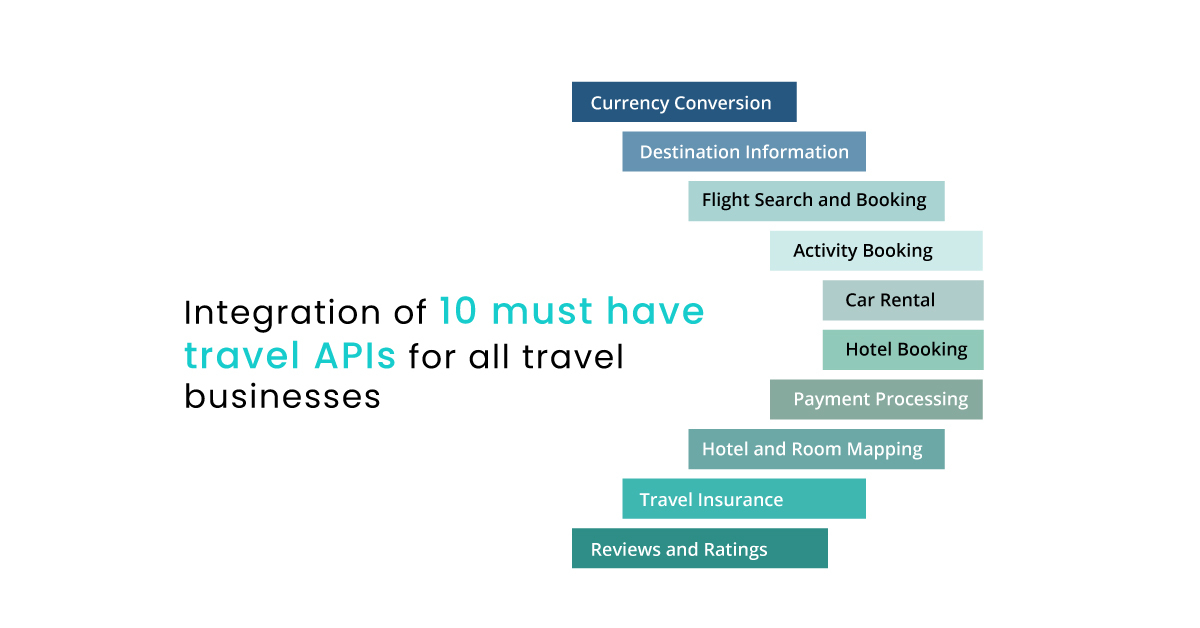Inventory is the heart and soul of all online travel businesses. The major element that triggers buying decisions is the content on your travel portal, along with their subsequent rates. If you are not acing the content, your marketing and sales efforts will not be able to support your growth. This is because the availability and the visibility both have significantly improved over the last decade.
Today, as many as 94% of travel consumers are using metasearch engines in their booking journey. Therefore, travel businesses with better content are likely to beat you in both new advertising channels like metasearch and in direct discovery. That’s why you need third-party data, which is facilitated best by travel APIs.
The need for travel content APIs
An API, or Application Programming Interface, is a set of protocols and tools for building software applications. In the case of travel APIs, these protocols and tools allow travel providers to access and integrate travel-related data, such as flight and hotel information, into their own applications.
The travel industry is one of the largest and most complex industries in the world. With a vast array of products and services offered, it can be challenging for travel providers to keep up with the latest offers and provide customers with accurate and up-to-date information. This is where travel APIs come into the picture. By using travel content APIs, travel providers can access a wealth of information from multiple sources, including airlines, hotels, car rental companies, and more, and integrate that data into their own applications.
The market of travel APIs and key integrations
The market for travel APIs is growing rapidly, with more and more travel providers looking to incorporate these APIs into their applications. According to a report by Research and Markets, the global travel API market is expected to grow at a CAGR of 11.9% from 2020 to 2025.
One of the key drivers of growth in the travel API market is the increasing use of mobile devices for travel bookings. With the rise of smartphones and tablet devices, more and more consumers are using these devices to book their trips. This has led to an increase in demand for travel content APIs that are mobile-friendly, allowing travel providers to offer a seamless mobile experience to their customers.
Another element that is driving growth in the travel API market is the increasing demand for personalized travel experiences. As customers become more discerning and demand more tailored travel experiences, travel providers are turning to travel content APIs to access a wider range of data, enabling them to offer more personalized and customized travel experiences to their customers.
Integration of 10 must-have travel APIs for all travel businesses

As we discussed previously, the travel API market is moving rapidly, so there’s an API for every function, you certainly don’t need all of them and clutter your travel portal. To make your job easier, here we have curated a list of ten must have APIS for online travel businesses. Let’s look at each of them separately.
1. Flight Search and Booking
Integrating flight APIs into your travel website can enable customers to search and book flights from multiple airlines in a single place. This saves time for customers, who would otherwise have to visit each airline’s website individually.
2. Hotel Booking
Travel APIs can provide access to a wide range of hotels, including independent hotels, chains, and budget options, allowing customers to compare prices, amenities, and locations.
3. Car Rental
Car rental APIs can provide customers with a range of rental cars, from budget options to luxury vehicles, and allow them to compare prices, pick-up and drop-off locations, and rental companies.
4. Destination Information
Integrating destination information APIs can provide customers with valuable information about their destination, including local weather, popular tourist spots, and cultural events.
5. Activity Booking
Travel APIs can provide customers with access to a wide range of activities, including tours, activities, and attractions, allowing them to easily plan their itinerary and book their experiences in one place.
6. Travel Insurance
Travel insurance APIs can provide customers with a range of insurance options, allowing them to compare coverage and prices and book insurance coverage for their trip.
7. Currency Conversion
Integrating currency conversion APIs into your travel website can provide customers with real-time currency exchange rates, making it easier for them to understand the cost of their trip and make informed purchasing decisions.
8. Reviews and Ratings
Integrating review and ratings APIs can provide customers with valuable information about their destination, hotel, and activities, allowing them to make informed decisions about their travel plans.
9. Payment Processing
Integrating payment processing APIs can allow customers to make secure and convenient payments for their travel arrangements, reducing the risk of fraud and increasing customer satisfaction.
10. Hotel and Room Mapping
Last but not least, these APIs provide a list of available hotels and rooms, allowing online travel businesses to update information such as rates, availability, and descriptions. The APIs can be integrated with other systems such as property management systems and channel managers to automatically update the information and reduce manual effort. The information provided by the API is used to display hotel and room information on websites and mobile apps, providing customers with accurate and up-to-date information when searching for and booking hotels and rooms. The use of these APIs helps to ensure the efficiency and accuracy of hotel and room information, ultimately improving the customer experience.
Wrapping up!
Integrating travel APIs provide travel businesses the ability to integrate an array of travel products, which is virtually impossible for them to do on their own. Their visitors get a one-stop shop to choose multiple travel products like flights, hotels, and transfers from one place without feeling the need for another platform,
Also, by utilizing these APIs, travel businesses can provide their customers with customized packages at competitive prices, which is a positive sum game for both travel companies and travelers.
Therefore, the integration of third-party APIs has become a winning formula for online travel businesses worldwide, and as we mentioned at the beginning of this article the travel API market is only going to strengthen in the coming times.








